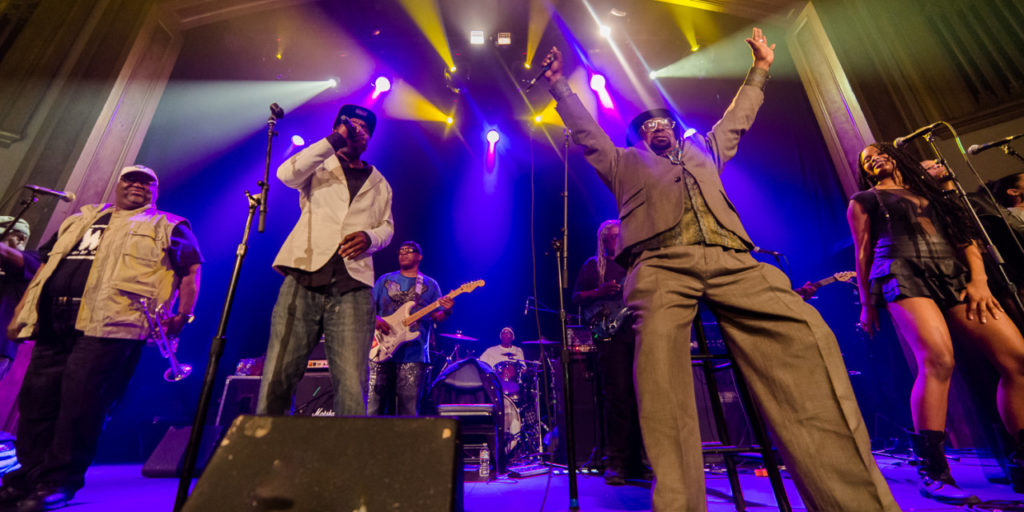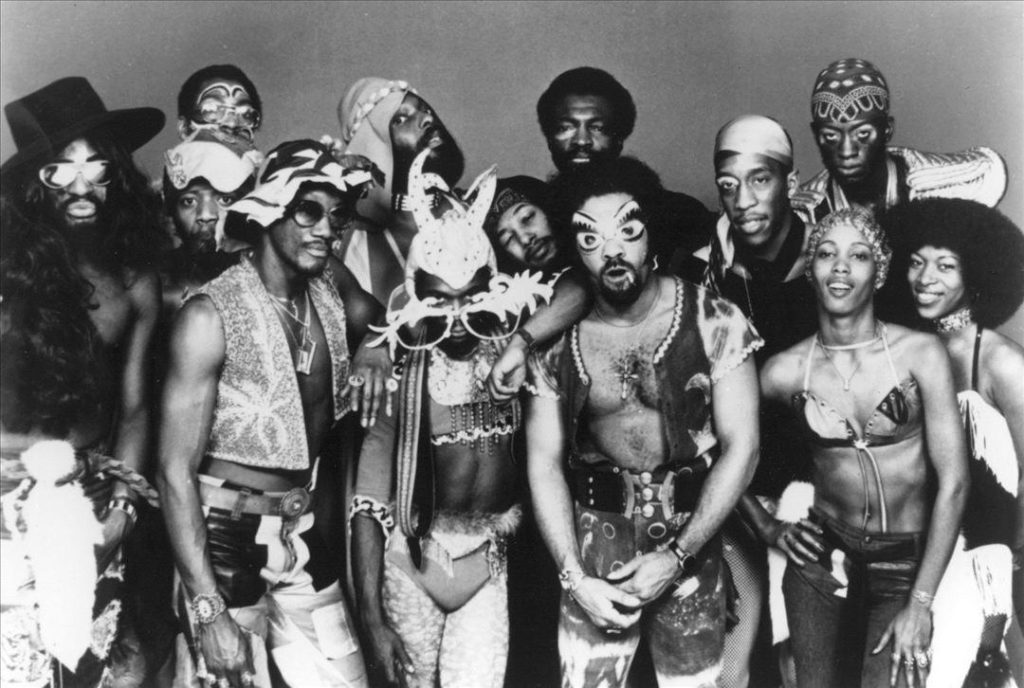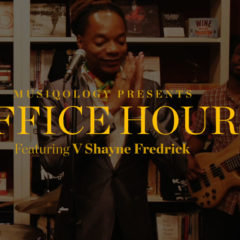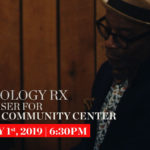Free your mind…and your ass will follow.
Such was the guarantee, chanted mystically on Funkadelic’s 1970 LP of the same name. Forty-plus years of records and antics from George Clinton (aka Dr. Funkenstein) later, seeing the Parliament-Funkadelic collective in concert is still an embodied, affective experience. The drums reverberate against your sternum. The guitars cut through your eardrums, loud and almost violent, sitting on the edge of heavy metal shredding. And the jams, chants, melodies, and rhythms free the body…and the ass follows.
On this night at Center City Philadelphia’s Underground Arts, a basement is packed to the gills with revelers eager to party with the fully operational Clinton once again. After decades of drug-addled wanderings, Clinton is enjoying a late-career renaissance including new music and his rightful place within the broader narrative of African American music in America. His voice adds layers to the first track on Kendrick Lamar’s acclaimed To Pimp a Butterfly. Donald Glover (aka Childish Gambino) has recently released Awaken, My Love, a set of songs directly influenced by the PFunk songbook. And the Mothership—a highlight of the arena-sized Parliament-Funkadelic tours of the 1970s that descended from the ceiling each night as part of a kind of religious revival—is a centerpiece of the newly opened National Museum of African American History and Culture in Washington D.C.
For the uninitiated, there’s more to the P-Funk Cosmos than meets the eye (or ear). Born July 22, 1941, the man would go on to become Dr. Funkenstein began his career writing doo-wop inflected tunes in a New Jersey barbershop before signing a songwriting contract with Motown records in the early 1960s. His soulful “(I Wanna) Testify,” released in 1967 by The Parliaments, hit #3 on the Billboard charts.
But Clinton was not long for Motown and he began to develop other work, drawing upon a unique constellation of musical influences that combined the funk of his immediate forerunner James Brown and the psychedelic rock of the long 1960s with the nascent ideas of what would be later called Afrofuturism and hip-hop. Clinton was the bridge figure—the horn melodies of jazz; the bass and off-beat hits of funk, the synths of disco. All are on display on this fall evening, with a setlist drawing on music throughout the catalogue.
With two groups—the re-branded but still pop-oriented Parliament and the more-experimental Funkadelic—Clinton recorded some of funk’s seminal tracks, including “Give Up the Funk (Tear the Roof off the Sucker)” (1976), “Flash Light” (1977), and “One Nation Under a Groove” (1978). Interspersed within the canon were political funk records such as America Eats Its Young (1972), Chocolate City (1975), and The Electric Spanking of War Babies (1981). Chocolate City envisioned a new government in Washington, D.C., with Muhammad Ali as president, Aretha Franklin as first lady, and comedian Richard Pryor as secretary of education. Funk to Clinton could be far more than a musical genre: it was political music.
A menagerie of characters followed, including the interplanetary traveler Star Child, returning to Earth on the Mothership to release funk that had been trapped in the pyramids and his nemesis Sir Nose D’Voidoffunk, a too-cool-to-dance poseur spreading the Placebo Syndrome of unfunkiness throughout the cosmos. Contained within the surrealistic album art, lyrical content, and stage show was a complex message of dance music’s human affect. Music should make you dance so hard your body would have no choice but to sweat (at one point the band segued into a tease of rapper Lil John’s “Get Low”, a strangely appropriate choice). And the body’s funky scent became proof of Clinton’s success and the body’s one-ness with the music.
The band today rocks harder than PFunks past, with the able shredding tradition of guitarists like Garry Shider and Eddie Hazel continued with a new generation of young players whose guitars cut through the basement space. In recent years, the PFunk stage show has become a bit bloated, with a dozen or so musicians on the stage at all times, but tonight each player serves a purpose, from the background vocalists to the hype-man, who makes sure the crowd knows that George has hit the stage given his transition from his afro-futurist costumes and iconic rainbow hairdo to a more conservative suit jacket and shaved head.
Musicologically, one of the most important signifiers in the Funk lexicon is the “One,” or the downbeat, which began to be emphasized in the bands of James Brown, moving away from the backbeat emphasis that was typical of African American music-making up to this time. By 1976, Clinton and Parliament had used the One for their own signifyin(g) purposes with the Clones of Dr. Funkenstein track, “Everything is on the One,” a chanted anthem extolling the virtues of the emphasis.
Chants are in the air at Underground Arts, as “We Want the Funk!” and “Shit! Goddamn! Get Off Your Ass And Jam” echo across the crowd as the band’s lengthy set stretches close to three hours. In between selections from Clinton’s more recent catalogue (2014’s First Ya Gotta Shake the Gate makes maybe a few too many appearances), it’s a greatest-hits affair, replete with an appearance from the anti-dance villain Sir Nose himself, who is shot with the “Bop Gun” and compelled to dance as the band plays “Flash Light.”
I said earlier that Clinton was the bridge from Seventies psychedelia to the rise of hip-hop as the world’s most influential musical genre. Underneath the rainbow locks was a pioneer—a fusion artist whose work is easily recognizable despite its idiosyncrasy. To wit, on this night everyone is barking along to the chorus of “Atomic Dog.” But besides the antics, the drugs, and the oddity, George Clinton’s influence makes him one of the most important musicians of the second half of the twentieth century and the crowd—enraptured by the size of it all—departs happily.
One last PFunk concept is funkentelechy, which the band defined in its literature as “a vital, vibrational force urging an organism toward self-fulfillment in actuality as opposed to potentiality.” Fulfillment by funk can be yours: “the kingdom of heaven is within,” the band whispered on “Free Your Mind And Your Ass Will Follow.” All it takes is the funk.




 Share On Facebook
Share On Facebook Tweet It
Tweet It








